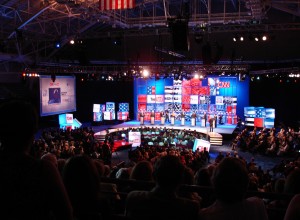
At last, we mere voters might get to watch a debate that will focus on the two top issues that virtually every poll places at the top of our concerns: jobs and the economy. Earlier debates have only lightly brushed on these matters. This is a great pity. Time for CNBC to give us a gold standard presidential debate with questions that matter.
As I wrote in my Forbes.com column “Here’s What’s Likely To Hurt the Republicans in 2016” last April:
“It’s the economy, stupid!” The weirdest thing about the onrushing 2016 presidential cycle is the scarcity of a GOP economic growth theme. Missing, too, is a serious growth agenda. That gap — not demographics, nor electoral college math — is the GOP’s most serious deficiency in its quest to regain the White House.
Democratic campaign consultant Bob Shrum wrote in his compelling political memoir No Excuses:
“Carville was obsessed with keeping the Clinton Campaign on message. That was easier with the ads than the candidate. A pledge to “end welfare as we know it” reassured voters in the middle. The point of the lance was economic: Clinton had an economic plan, a health care plan; Bush didn’t and you couldn’t trust what he said anyway. But it was hard to channel a candidate who was a policy prodigy. Clinton’s broad reading and interests sometimes led him to break out of the message box of his own campaign. I was on the phone with Carville one day when he said he had to hang up; the road was calling in. He was agitated when we talked a little while later. Somewhere in the Midwest, he said, Clinton had suddenly launched into a soliloquy on nuclear nonproliferation. There wasn’t one goddamn vote in it, Carville shouted at me—a warning he had delivered, a little more respectfully, to his contrite candidate. When James put up his famous sign in the war room—“It’s the economy, stupid!”— it was not just an admonition to the strategists and to the staff, but to one very smart former Rhodes Scholar named Bill Clinton. He’d never won one of those fancy scholarships, Carville told me on vacation after the campaign, but it didn’t take a genius to know what this election was about.”
There are many good questions to be posed. At the top of the list surely, given the scheduled announcement that very day by the Federal Reserve as to its discount rate policy, is the role of the Fed in fostering, or retarding, economic growth. As I also wrote at Forbes.com, recently, in taking to task Donald Trump (now plateaued, or perhaps even subsiding, in the polls):
Trump’s position, on which he doubled down for Bloomberg, seems to be that raising interest rates will produce “a recession, or worse.” And then he berates Yellen for not raising rates. This, at best, is perverse.
“Recession Now?”
Not supply-side.
No mainstream reporter (I am merely a commentator) has called Donald Trump out for demanding a rate increase that he, himself, has called a recipe for “a recession, or worse.” (In an earlier interview Trump called it a recipe for a “recession-slash-depression.)
Now’s the chance to cross examine Mr. Trump about this apparent internal contradiction, and certainly his calling for a policy which he seems to believe could cause a depression is a contradiction to his claim that he would be “the greatest jobs president God has ever created.”
Meanwhile, Sens. Paul and Cruz are co-sponsors of the Brady-Cornyn Centennial Monetary Commission legislation that passed House Financial Services Committee and is widely expected to be brought up for a floor vote in the House reasonably soon. Paul, Cruz, and Rubio also are co-sponsors of the famous Audit the Fed legislation (that twice has passed the full House and has 32 sponsors in the Senate, although it is bottled up in committee.)
Former Fed Chairman Ben Bernanke has been acidly critical of the Audit The Fed legislation, with ire for its prime sponsor Sen. Paul. This is a perfect hook for the reporters to draw Sens. Paul, Cruz and Rubio, especially, out on their views on the Fed and on monetary policy. So, CNBC, bring it on!
Meanwhile, there’s the ever-popular subject of taxes. Dr. Carson has called for a flat tax. As summarized by the National Federation of Independent Business, this would:
- Tax all Americans, rich or poor, at the same percentage rate
- Introduce a Constitutional amendment requiring Congress to balance the federal budget each year
- Raise about $1.1 trillion in revenue, according to Citizens for Tax Justice (for comparison, the Congressional Budget Office estimates that the federal government will raise $3.5 trillion and spend about $3.9 trillion next year)
- Slash federal spending by 72 percent—the equivalent of cutting Social Security, Medicare and Medicaid, food stamps, and the entire U.S. military, according to the Washington Post
Farewell, Army, Navy, Air Force, Marines! It is not entirely uninteresting to imagine America without a military. One easily imagines a box of chocolates and thank you note from Mssrs. Putin and (if he is still alive) al-Baghdadi (or his successor) would arrive at 1600 Pennsylvania Avenue posthaste after President Carson’s inauguration. Neither Putin nor al-Baghdadi, however, get a vote in either the Republican primary nor the general election.
And one wonders how senior citizens will respond to the abolition of their Social Security and Medicare benefits, two highly popular social insurance programs into which we have spent a lifetime paying and on which many of us are depending for sustenance in our old age. Will we find this a compelling reason to vote for Dr. Carson?
How about the 40-plus percent of people who currently do not pay federal income taxes, because they are poor or subsistence workers, desperately struggling to make ends meet? How eager will these tens of millions of voters be to vote for a candidate campaigning on the promise of a whopping tax increase for them?
As for the more … mainstream … candidates, each of their tax proposals so far on record have been scored as raising the federal debt by, well, trillions of dollars. No sufficiently offsetting budget cuts have been proposed. (Back in the days of the Supply-Side Wars, on whose supply-side side I proudly fought and to which I remain committed, this tactic was called “the magic asterisk.”)
As myself having deep Tea Party roots, promising to jack up the deficit doesn’t really sound like a big vote-getter among conservative activists. Moreover, Gallup places current popular concern over taxes at … 1 percent. (Could there be a reason that we mere voters feel that the political class really isn’t listening!)
The respective candidates’ entirely concocted speculations (for example, no less than 4 percent by Gov. Bush and 6 percent by Mr. Trump and Gov. Huckabee) as to their rate of economic growth sound more like the return of Rosy Scenario than anything rationally defensible. I’m an inveterate believer in 4-plus percent growth.
That said, as Ludwig Mies van der Rohe (not, I hasten to point out, Ludwig von Mises) once said, “God is in the details.” How will what the candidates are proposing get us there? (Hint to the candidates! Much better Fed policy — which recipe best can be adduced by the Centennial Monetary Commission — demonstrably is central to getting this right.)
There assuredly will be questions about the new free trade deal, the TPP, pending in Congress (the one Hillary Clinton — Happy Belated Birthday! — called “the gold standard” of free trade deals something like 45 times, although is now is a position of walking that claim back at a vertigo-inducing speed). The TPP is drawing much fire from both the right and the left. It would be interesting to hear what the candidates have to say. That said, since the specifics have not yet been publicized, it’s an easy question to duck.
No, what’s really affecting the electorate is the slow pace of economic growth and job creation of the past 15 years, an epoch I have termed “The Little Dark Age.” What’s really besetting the economy now is the mysterious productivity bust, as recently summarized in The Washington Post by columnist Bob Samuelson, and the failure of productivity increases to be robustly shared by workers as here summarized in The Atlantic by Gilliam B. White.
What might the candidates have to say about this? Have any of them even heard of it? Let’s find out, CNBC!
Back to Shrum’s recollection of Carville:
When James put up his famous sign in the war room—‘It’s the economy, stupid!’— it was not just an admonition to the strategists and to the staff, but to one very smart former Rhodes Scholar named Bill Clinton. He’d never won one of those fancy scholarships, Carville told me on vacation after the campaign, but it didn’t take a genius to know what this election was about.
It “didn’t take a genius to know what this election was about,” and it doesn’t take a genius to figure out what this one is about either. High hopes that CNBC’s reporters will drill down to the bedrock of how the candidates propose to restore equitable economic growth … beginning with restoring high integrity monetary policy.
Ralph Benko, internationally published weekly columnist, co-author of The 21st Century Gold Standard, lead co-editor of the Gerald Malsbary translation from Latin to English of Copernicus’s Essay on Money, is American Principles Project’s Senior Advisor, Economics.


